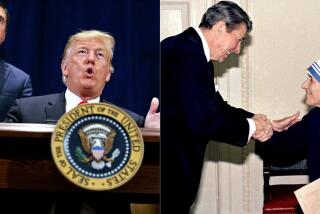Regan Calls Stock Market ‘Ticking Bomb,’ Urges Program Trading Ban
- Share via
WASHINGTON — Former Treasury Secretary Donald T. Regan, steering clear of subjects like astrology and sounding an alarm over the nation’s still-jittery stock market, urged Congress on Wednesday to ban all program trading, which has been widely blamed for aggravating last October’s crash.
The market as now regulated “is a ticking bomb, and there could be another stock market fall of large proportions,” Regan told reporters after a hearing of the Senate Banking, Housing and Urban Affairs Committee, which is considering legislative measures aimed at calming the stock market.
Regan, chairman of Merrill Lynch before he came to Washington, joined brokerage house chiefs Charles R. Schwab and George L. Ball in denouncing the Reagan Administration and Congress for failing to push through quick regulatory reform and thus possibly destroying the confidence of small investors.
Astrological quips and other allusions to the controversial new “kiss-and-tell” book by Regan, who is also a former White House chief of staff, punctuated the morning-long Capitol Hill testimony. The book says that Nancy Reagan regularly sought astrological guidance before giving her approval to President Reagan’s schedule.
Regan has appeared eager to talk about his book, granting interviews and going on talk shows. On Wednesday, however, he bluntly turned away reporters’ questions on the controversy, saying, “I don’t want to use a congressional hearing as a kind of promotional stunt.”
Nonetheless, inside the Senate hearing room, Regan was not spared some good-natured jibing.
“I am a Leo,” Sen. Alfonse M. D’Amato (R-N.Y.) announced to open his remarks on market regulation. To the laughter of a packed hearing room, D’Amato went on to read his own horoscope for the day and that of Regan, which warned ominously that he would have to work hard to “get (his) point across.”
Regan himself made several apparent references to the current storm surrounding his book. “I am happy to be here,” he told the Senate panel, “even though your hearing comes at an interesting time in terms of my own activities.” He also mentioned his “life after government--and, believe me, there is one.”
Later, asked by Sen. Donald W. Riegle Jr. (D-Mich.) to explain the Administration’s apparent lack of urgency in responding to last fall’s market crash, Regan said he was not informed enough to comment and added, “Obviously, since the book has come out, I’m not going to be in touch with this Administration.”
Astrology aside, the Senate hearing focused on regulatory measures to avert a repeat of last October’s market crash.
Senators and witnesses keyed on program trading, a controversial practice that involves computerized tracking and speculating on trends in stock index futures and that critics say has exacerbated the already-volatile nature of the stock market.
Five major Wall Street firms announced this week that they will suspend program trading for their own accounts.
With no clear consensus yet emerging from Congress or the White House on regulatory reforms, Regan and other financiers warned that time may be running out to regain the confidence of small investors.
Urging a ban on index option arbitrage and other reforms, Regan said: “The public has every reason to believe the present game is rigged. It is. Many would be better off in the casinos. . . . I don’t think it’s too extreme to say that overall confidence in our free-market system is threatened by this sort of scandal. And that’s what it is--a scandal.”
Regan’s co-panelists--Ball, chairman of Prudential-Bache Securities, and Schwab, whose discount stock brokerage firm is the nation’s largest--said recent polls of their customers have disclosed the chilling effect of program trading.
The surveys showed that nearly two-thirds of Schwab’s clients and more than half at Prudential-Bache said program trading has sapped their confidence in the market and harmed their investments. “They feel cheated,” Ball said.
An abolition of stock index futures “may seem to be a relatively radical notion for a free-market advocate to put forth . . . (and) would not be without painful short-term costs,” Ball acknowledged. “But these are highly unusual times, ones that call for unusual initiatives.”
More to Read
Sign up for Essential California
The most important California stories and recommendations in your inbox every morning.
You may occasionally receive promotional content from the Los Angeles Times.













